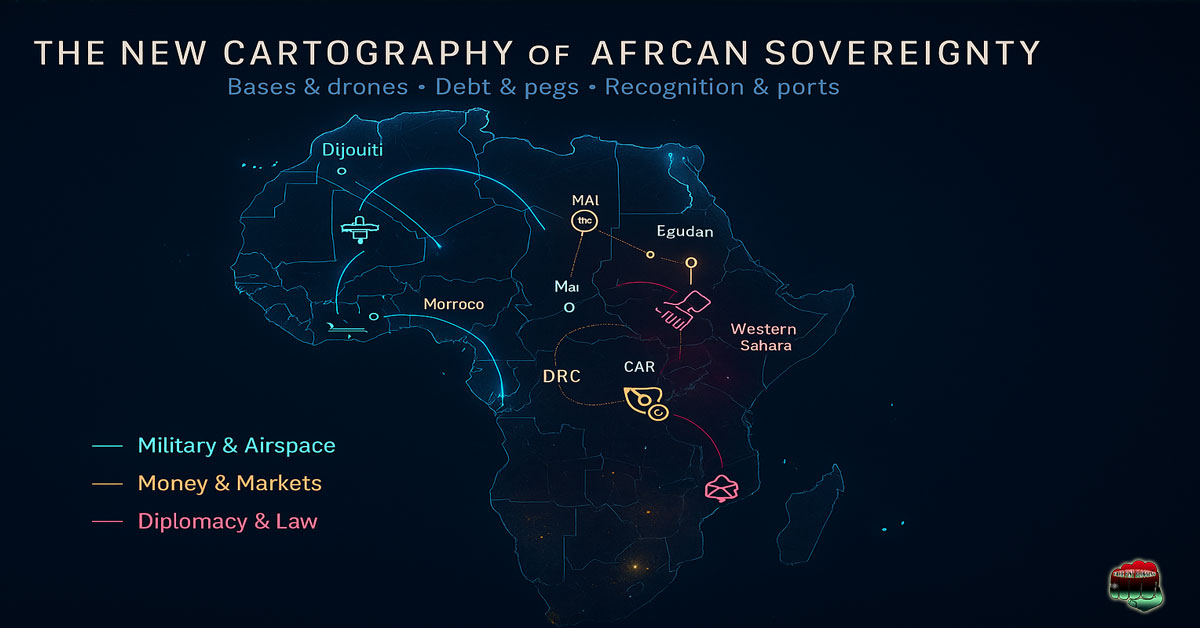By InnerKwest Editorial-Research Desk • August 16, 2025
Executive Summary
Across Africa, sovereignty functions on a spectrum—pulled by foreign military footprints and air operations, hard-currency pegs and IMF programs, port leases and security pacts, and recognition politics. This report maps where external levers are strongest right now and explains how they translate into day-to-day constraints on government choices.
Vectors of influence we track:
- Military & Airspace: foreign bases, advisors, drone strikes, and overflight realities.
- Money & Markets: IMF programs, debt restructurings, currency pegs.
- Diplomatic & Legal Pressure: recognition disputes, port/sea-access deals, territorial arrangements.
How Sovereignty Is Constrained (Quick Primer)
Military Presence & Airpower
Foreign forces—overt bases, “trainers,” ISR assets, and periodic airstrikes—shape security decisions and, in some theaters, control the operational picture. Somalia, Libya, Djibouti, the central Sahel, Sudan, and eastern DRC are clearest examples.
Finance, Debt & Money
IMF programs and restructurings bring liquidity with conditionality. Meanwhile, 14 countries in WAEMU/CEMAC run currencies pegged to the euro under a French convertibility guarantee—an enduring trade-off between stability and policy flexibility.
Diplomacy, Law & Recognition
From Western Sahara to the Ethiopia–Somaliland MoU, recognition and access deals pressure policy without a single foreign boot on the ground.
Country Snapshots (Evidence-Based)
Djibouti: The World’s Base Camp
Djibouti hosts the densest mix of foreign militaries on the continent—U.S. (Camp Lemonnier), China’s first overseas base, France, Japan, Italy, and others. Access fees bring revenue; the density of bases creates structural dependency and external veto points.
Somalia: A 10-Year Defense Pact with Türkiye + Ongoing U.S. Air Operations
Somalia’s 10-year maritime/defense deal with Türkiye includes naval rebuilding and EEZ cooperation. U.S. AFRICOM continues periodic airstrikes on al-Shabaab/ISIS-Somalia—shaping airspace and operational tempo.
Libya: Foreign Troops and Drones Freeze the Front Lines
Turkish and Russian footprints, plus Emirati support, have “frozen” hostilities while entrenching leverage over any settlement and airspace dynamics.
The Central Sahel (Mali, Burkina Faso, Niger): Swapping Patrons, Not Pressure
- Mali pivoted from France/UN to Russia’s state-backed “Africa Corps” (post-Wagner).
- Burkina Faso followed a similar path, deepening ties with Moscow.
- Niger expelled U.S./French forces in 2024; Russian trainers have since arrived.
In each case, sovereignty pressure shifted vectors rather than disappeared.
Sudan: A Civil War Internationalized from the Air
Reports document Iranian drones for the army and alleged UAE-linked arms to the RSF (which the UAE denies). Drone warfare and air supply lines now shape outcomes and sovereignty costs.
DRC (Congo): Neighbors, Sanctions, and a Contested Sky
UN expert reporting continues to cite Rwandan support to M23. GPS interference and cross-border operations complicate flight safety and peacekeeping withdrawal timelines—constraining freedom of action.
Egypt: IMF Steering + A $35B Gulf Mega-Deal
Alongside a multi-year IMF program, Egypt’s Ras El-Hekma investment agreement with the UAE hard-wires fiscal, FX, and privatization benchmarks—stabilizing the macro picture while steering policy choices.
Ghana, Zambia, Kenya: Program Conditionality as Policy Rail
- Ghana: successive IMF reviews and disbursements with coordinated debt relief.
- Zambia: IMF reviews and multi-party debt workouts (incl. Chinese/privates) shape budgets.
- Kenya: repeated IMF engagements; reform calendars and tax politics now track review dates.
WAEMU & CEMAC: Euro Peg, Enduring Trade-Off
Fourteen countries in WAEMU (XOF) and CEMAC (XAF) operate under a French guarantee and a fixed euro peg. WAEMU reformed some mechanisms (2019/2021), but the peg endures; CEMAC’s regime persists. The bargain: price stability vs monetary autonomy.
Ethiopia–Somaliland–Somalia: Sea Access, Recognition, Mediation
Ethiopia’s 2024 MoU with Somaliland for port/potential naval access triggered crisis with Somalia and a Turkish-mediated de-escalation (the Ankara process). A case study in how access deals can pressure sovereignty without formal annexation.
Chad: France Out, New Alignments In
N’Djamena terminated its defense accords with France (late 2024), ending a decades-long security umbrella and opening space for new partners (UAE, Russia) to compete for influence.
Eritrea: Assab as a Case Study in Rented Sovereignty
From 2015 to ~2021, the UAE leased and expanded Assab as a forward base for the Yemen war, later scaling it down—illustrating how foreign deployments surge, recede, and leave lasting strategic habits.
Kenya: Training Hub for Western Partners
The U.K.’s BATUK and broader U.S./U.K. cooperation make Kenya a regional training hub—short of permanent combat basing but still a mode of operational dependency (and periodic domestic friction).
Morocco / Western Sahara: Recognition Politics & Drones
U.S. recognition of Moroccan sovereignty over Western Sahara (2020) has been reiterated by partners in 2025; France has signaled support. Drone proliferation along the berm reshapes the risk calculus.
Where Leverage Is “Heaviest”
Multi-Vector Dependence (Several Channels at Once)
Djibouti, Somalia, Libya, Mali, Burkina Faso, Niger, CAR, Sudan, DRC.
Common pattern: foreign forces and/or contractors, air operations, plus financial or diplomatic leverage, combining to narrow sovereign room for maneuver.
Dominant Single-Vector Dependence
- Finance/Investment: Egypt, Ghana, Zambia, Kenya (IMF programs, mega-deals).
- Money: WAEMU & CEMAC (euro peg, French guarantee).
- Security/Basing: Chad, Eritrea (historical/transitioning basing).
- Recognition/Defense Ties: Morocco (Western Sahara, allied defense links).
Why This Matters (For Editors & Readers Using InnerKwest to Verify)
- Airpower is domestic policy now. Drone strikes, ISR, and overflight permissions have become policy levers as consequential as cabinet decisions.
- Debt terms are foreign policy. IMF reviews and hard-currency pegs set calendars for tax, subsidy, and privatization battles. Expect synchronized policy moves around review/disbursement windows.
- Recognition and access deals redraw influence without maps. Ethiopia–Somaliland, Western Sahara, and Red Sea port politics prove that legal gray zones are now the main arena where leverage is won or lost.
A Note on “Colonized Mindsets”
The phrase captures a real cultural critique but often obscures material levers—currency regimes, basing rights, debt covenants, export controls—that we can test and timestamp. Where narratives matter (e.g., information ops dressed in Pan-Africanist rhetoric), we focus on documented campaigns and offline effects rather than labeling whole societies.
What to Watch Next
- AFRICOM strike cadence in Somalia and any expansion of authorities.
- Russia’s “Africa Corps” rotations among Sahel capitals.
- IMF board calendars for Egypt, Ghana, Zambia, Kenya (policy actions often cluster around review dates).
- Western Sahara diplomacy: U.S./France positions; drone activity along the berm.
- Ankara mediation outcomes in the Ethiopia–Somaliland–Somalia triangle.
Source Notes (Selected, For Transparency)
- AFRICOM releases on Somalia (strike reports and monthly summaries).
- Türkiye–Somalia 10-year maritime/defense pact (official communiqués and parliament notes).
- Djibouti basing landscape (U.S., China, France, Japan, Italy).
- Libya foreign-force entrenchment (Türkiye/Russia/UAE) documented by think-tank and UN reporting.
- Russia’s “Africa Corps” and the transition from Wagner (official statements & investigative reporting).
- U.S./French withdrawals from Niger; arrival of Russian trainers (government statements, wires).
- Sudan war externalization: drones and arms channels (UN reporting, investigations, official denials).
- DRC Group of Experts and UNSC briefings on M23, cross-border support, GPS interference.
- Egypt IMF program + Ras El-Hekma UAE deal (IMF staff reports; official announcements).
- Ghana/Zambia/Kenya IMF engagements and review outcomes (board documents, MOF statements).
- WAEMU/CEMAC currency regime and French guarantee (regional bank communiqués; French MoF statements).
- Ethiopia–Somaliland MoU & Ankara mediation (official statements from Addis, Mogadishu, Ankara).
- Western Sahara: U.S. and France positions; drone acquisition/use (official releases, defense trade reports).
(InnerKwest is available to supply live links and primary documents upon request.)
Support InnerKwest: Powering Truth & Excellence with Bitcoin
At InnerKwest.com, we are committed to delivering impactful journalism, deep insights, and fearless social commentary. Your Bitcoin contributions help us execute with excellence, ensuring we remain independent and continue to amplify voices that matter.
Support our mission—send BTC today!
🔗 Bitcoin Address: 3NM7AAdxxaJ7jUhZ2nyfgcheWkrquvCzRm© 2026 InnerKwest®. All Rights Reserved | Haki zote zimehifadhiwa | 版权所有.
InnerKwest® is a registered trademark of Inputit™ Platforms Inc. Global
No part of this publication may be reproduced, distributed, or transmitted in any form or by any means without prior written permission. Unauthorized use is strictly prohibited.
Thank you for standing with us in pursuit of truth and progress!![]()


